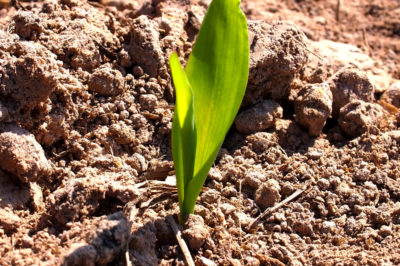What Are Corn Seedlings?
Simply put, corn seedlings are the young corn plants that come up after your corn seeds germinate. Most people consider the corn plants seedlings until they reach about the height of your knees. Corn seedlings reach this height approximately six to eight weeks after planting.
Growing Requirements for Corn Seedlings
Once your corn has germinated, your corn seedlings need the following in ample amounts:
- Sunshine. Corn requires at least eight-ten hours of sunshine each day.
- Fertilizer. You should apply a nitrogen-only organic fertilizer once the seedlings are well-established.
- Weed Control.
- Frequent watering.
Tip: Water the corn whenever the ground starts to appear dry, at least weekly.
Keeping Corn Seedling Healthy
After the corn seedlings are between three and four inches (seven-ten cm) tall, thin the plants so there is one plant every eight inches.
One of the easiest ways to give your corn seedlings a great start and to keep them healthy is by applying a thick layer of mulch around each plant. Mulch not only helps you control weeds, but it also helps the soil stay moist in between watering.
When weeding your corn, be sure to pull the weeds by hand rather than using a cultivator. The shallow root system of your corn plants can be damaged if you use sharp tools.
Pest and Disease Control
Regardless of how healthy the corn seedlings appear, you do need to be on the lookout for an infestation of pests. As soon as you see signs that bugs are attacking your plants, you should apply an organic pesticide.
Diseases can also decimate your entire corn crop, so watch out for browning or spotted leaves. These could indicate your corn has a disease, and the sooner you can treat it, the better chance you have to get rid of it.
Keep in mind that you will not have fresh mature corn if you do not have healthy seedlings. As long as you make sure your plants have the best growing environment possible, you should expect a good harvest.
